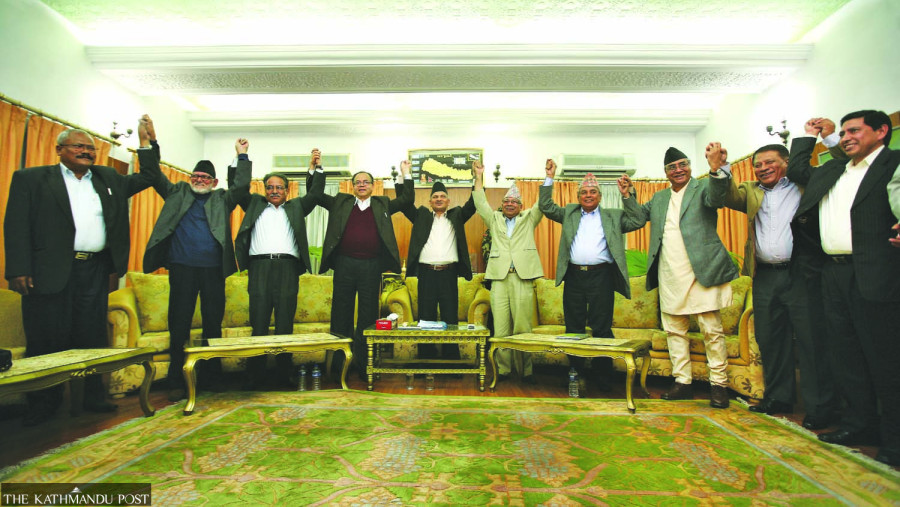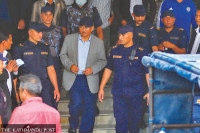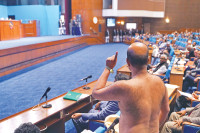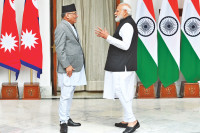Politics
Yearender 2022: Still waiting for justice after 16 years
The thousands of victims of the decade-long Maoist insurgency do not trust the government anymore as no progress has been made in providing justice.
Binod Ghimire
Somebody rightly said that justice delayed is justice denied.
On August 8, 2021, the five-party coalition government led by Sher Bahadur Deuba unveiled its common minimum programme which included a pledge to conclude the peace process by expediting the transitional justice process.
The Nepali Congress, CPN (Maoist Centre), CPN (Unified Socialist), Janata Samajbadi Party and Rastriya Janamorcha claimed that the long pending task of providing justice to the thousands of victims of the decade-long Maoist insurgency would take the proper course under their government.
Being party to the insurgency in one way or another, the Congress and the Maoist Centre have a keen interest in transitional justice; but even after getting to lead the government more than once, neither party has been able to conclude the process.
On April 7, Deuba appointed human rights lawyer Govinda Sharma Bandi as the Minister for Law and Justice with the sole mandate to bring the transitional justice process on track. Taking charge of the ministry, Bandi claimed that he would lead an amendment to the Enforced Disappearances Enquiry, Truth and Reconciliation Commission Act 2014 during his six-month term. The pledge never materialised.
The victims are still left high and dry. Deuba’s administration ended without any remarkable progress.
“We had expected that the victim-centric transitional justice process would begin this year under Bandi’s leadership,” Suman Adhikari, founding chairperson of the Conflict Victims Common Platform, told the Post. Adhikari’s father was killed by Maoist combatants in 2001.
“It was just false hope. The victims have lost faith in the government as no progress has been made towards providing justice even 16 years after the end of the insurgency.”
In 2015, Nepal’s top court directed the government to amend the amnesty provisions in the Enforced Disappearances Enquiry, Truth and Reconciliation Commission Act in compliance with international principles of transitional justice and Nepal’s international obligations towards human rights.
Every stakeholder, from conflict victims to human rights defenders and human rights organisations, has long been demanding an amendment to the law arguing that it is a prerequisite to advancing the transitional justice process. They have been demanding that the act be amended before appointing the chairpersons and members of the two commissions after broad consultations.
After more than three months of homework, the Law Ministry on July 15 registered an Amendment Bill to the Act in the House of Representatives. The ministry also extended the terms of the two commissions. Meanwhile, the government decided to bid farewell to the chairpersons and members with the hope that the act would be amended by the time the lower house got dissolved.
However, the amendment bill landed in controversy as it retained the amnesty provisions against the Supreme Court’s ruling.
According to the bill, cruel murder or murder after torture, rape, enforced disappearances and inhumane torture committed against unarmed or ordinary people during the insurgency are serious human rights violations and non-amnestiable.
The decision to only list cruel murder as non-amnestiable was criticised by different quarters arguing that it provides a loophole to define all sorts of murders during the insurgency as non-cruel, and grant amnesty to the perpetrators.
Disregarding concern from stakeholders, the ruling parties were not ready to list all kinds of murder as non-amnestiable crimes.
The bill also didn’t include war crimes and crimes against humanity under serious human rights violations while leaving the subject of former minor combatants out of the ambit of the transitional justice process. The term of the lower house expired with the November 20 elections before the Law Ministry could find a meeting point on the controversial issues.
Talking to the Post on different occasions, Bandi has reiterated that the bill will be endorsed. He blames critics for failing to understand the positive realisation the bill has embraced, but stakeholders say the bill was prepared with a hidden intention to protect the perpetrators, and a larger intention to avoid prosecution and grant amnesty even for violations of human rights.
“Several attempts have been made to conclude the transitional justice process without prosecution. Such attempts have been foiled by the victims and civil society,” Govinda Sharma Poudyal, former member of the National Human Rights Commission, told the Post.
“The political class must understand that the transitional justice process won’t conclude unless justice is delivered to every victim.”
The Comprehensive Peace Accord signed on November 21, 2006, that brought the belligerent Maoists into mainstream politics, marked the beginning of the peace process.
The peace process comprised three goals—integration of Maoist combatants into the security agencies, socio-economic transformation through a constitution promulgated by a Constituent Assembly, and justice to the victims of the atrocities committed by the state security agencies and the insurgents.
The first two tasks have been completed; but the goal to provide justice to the thousands of victims through the transitional justice mechanisms has stalled.
One of the clauses in the accord says both the government and the Maoists will reveal information about people who were disappeared or killed during the conflict within 60 days of the deal being sealed. The two sides also agreed to expedite the transitional justice process immediately.
“That’s too harsh for the victims waiting for justice,” said Adhikari. “Our criminal justice system is heavily politicised. None of the parties has abided by their written commitment,” said Adhikari.

The victims and human rights defenders say it is clear that none of the parties is sincere in concluding the process by adhering to the established principles because they were associated with the insurgency in one way or another.
The Truth and Reconciliation Commission has received 63,718 complaints, but it has barely conducted preliminary investigations into 7,000 cases besides paying compensation to some 100 victims.
The performance of the Commission of Investigation on Enforced Disappeared Persons is no better. It has received 3,223 complaints of enforced disappearances at the hands of the state security forces and the Maoists.
After a preliminary investigation, the commission has identified 2,484 cases as genuine although the International Committee of the Red Cross says 1,333 people are still missing in connection with the armed conflict.
The conflict victims say they will continue to raise their voice for justice.
Ganesh Malla, 52, who was tortured by the Maoists from Kailali, says he will not rest unless justice is delivered. “I want everyone who tortured me and looted my property to be tried under law,” he told the Post. “I will continue fighting for justice until my last breath.”
Some of the victims were elected to Parliament in the November 20 elections. They say they will exert pressure on the government from Parliament to expedite the process.
“As a lawmaker and representative of the thousands of victims, I will raise my voice for justice,” Maina Karki, immediate past chairperson of the Conflict Victims Common Platform, told the Post.
“Let us see if we succeed in our objective next year. Everyone should get justice.”




 10.12°C Kathmandu
10.12°C Kathmandu















